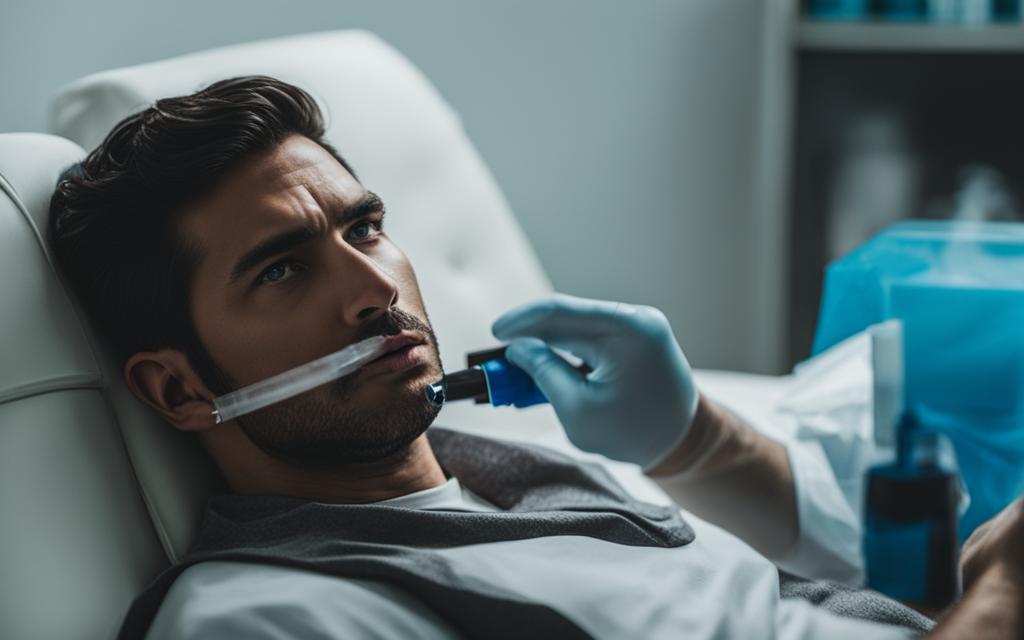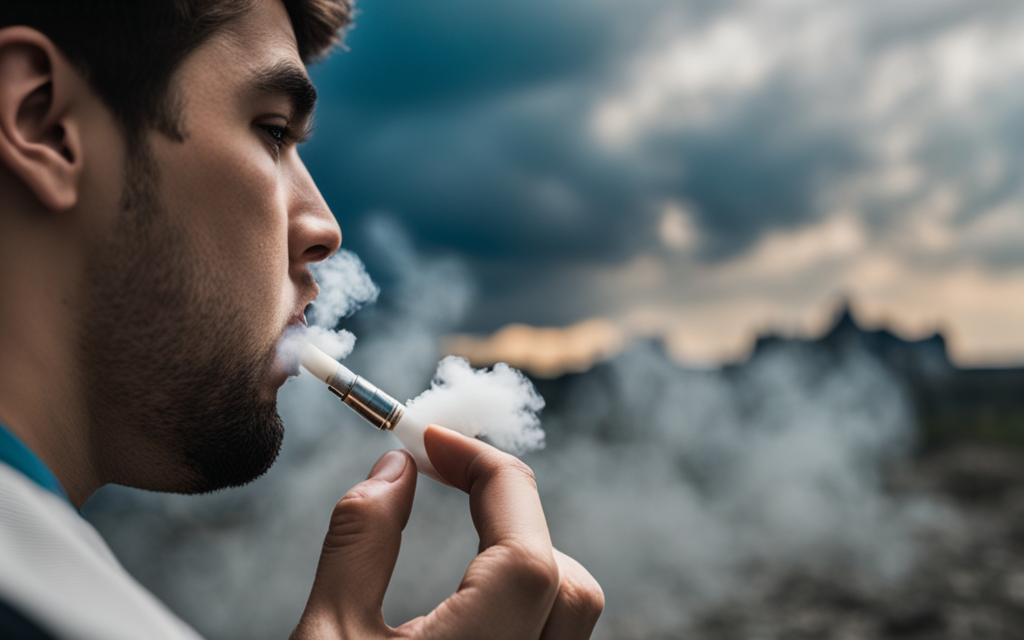After wisdom teeth removal, many patients wonder if it is safe to vape. Vaping involves inhaling the aerosol from an e-cigarette or vape device. While vaping may seem like a safer alternative to smoking, it is important to understand the potential risks and complications it can pose during the recovery process.
Vaping can irritate the healing tissues, increase recovery time, and potentially lead to infections. The heat, tar, and chemicals in vape devices can also cause inflammation, gum disease, slow healing, and even dry socket. It is important to consult with your oral surgeon and follow their instructions to ensure a safe recovery after wisdom teeth removal.
Table of Contents
Toggle- The Dangers of Vaping
- The Impact of Vaping on the Healing Process
- Conclusion
- FAQ
- Can I vape after getting my wisdom teeth out?
- How long does it take to recover from wisdom teeth removal?
- Why is it important to avoid smoking or vaping after oral surgery?
- What is dry socket, and how can smoking or vaping increase the risk of it?
- Are there any alternative methods to vaping or smoking that I can use during my recovery?
- How can I promote a faster and smoother recovery after wisdom teeth removal?
- Related posts:
Key Takeaways:
- Vaping can have negative effects on the healing process after wisdom teeth removal
- It can irritate healing tissues and potentially lead to infections
- The heat, tar, and chemicals in vape devices can cause inflammation and gum disease
- Vaping can slow down the healing process and increase the risk of dry socket
- Consult with your oral surgeon for post-operative care instructions and abstain from vaping to promote optimal oral health
The Dangers of Vaping
Vaping after dental surgery, such as wisdom teeth removal, can have serious consequences for your health and recovery process. It is crucial to understand the potential dangers associated with vaping and take the necessary precautions to ensure a smooth and successful healing journey.
“Vaping has been linked to various serious injuries and illnesses, including lung injuries, seizures, strokes, cardiovascular issues, nicotine addiction, battery explosion injuries, and even death.”
— Centers for Disease Control and Prevention (CDC)
Contrary to popular belief, vaping is not a safe alternative to smoking. The chemicals, heat, and tar present in vape devices can cause inflammation and irritation to the healing tissues in your mouth after dental surgery. This irritation can prolong the recovery process, increase the risk of infections, and potentially lead to complications such as dry socket.
It is vital to prioritize your oral surgery recovery and follow the best practices after wisdom teeth removal. By refraining from vaping and adhering to your oral surgeon’s instructions, you can minimize the risks associated with vaping and promote a quicker and smoother healing process.
Why is Vaping Harmful after Dental Surgery?
Vaping exposes your healing oral tissues to harmful chemicals and heat, which can impede the natural healing process. Additionally, the suctioning or sucking motion involved in vaping can disrupt blood clot formation, increasing the likelihood of developing dry socket.
Dry socket occurs when the blood clot that forms in the extraction site after tooth removal becomes dislodged or dissolves prematurely. This condition exposes the underlying bones and nerves, causing severe pain and delaying the healing process. Avoiding vaping after dental surgery is crucial to prevent the occurrence of dry socket and other complications.
Best Practices After Wisdom Teeth Removal
To ensure a successful recovery after wisdom teeth removal, follow these best practices:
- Abstain from vaping or using any tobacco or nicotine products.
- Avoid drinking through a straw or engaging in activities that create a suction in your mouth.
- Stick to a soft or liquid diet for the first few days and gradually reintroduce solid foods as advised by your oral surgeon.
- Take prescribed pain medications and antibiotics as directed.
- Rinse your mouth gently with warm saltwater after meals to keep the extraction sites clean.
- Avoid strenuous physical activities and get plenty of rest to aid the healing process.
Following these best practices can help facilitate a smooth and complication-free recovery after wisdom teeth removal, reducing the risks and promoting optimal oral health.
| Complication | Description |
|---|---|
| Dry Socket | Occurs when the blood clot in the extraction site becomes dislodged or dissolves prematurely, exposing the underlying bone and nerves and causing severe pain. |
| Infections | The heat, chemicals, and irritants present in vaping can increase the risk of oral infections, which can further delay the healing process and require additional medical attention. |
| Prolonged Healing | Vaping can irritate the healing tissues and slow down the natural healing process, leading to a longer recovery time. |

The Impact of Vaping on the Healing Process
Smoking or vaping after oral surgery, such as wisdom teeth removal, can have a detrimental impact on the healing process. The heat, tar, and chemicals present in tobacco and vape products can irritate the delicate healing tissues and impede the body’s natural recovery mechanisms.
These harmful substances can cause inflammation, leading to gum disease and slowing down the healing process. The suctioning or sucking action involved in smoking or vaping can also disrupt the formation of blood clots, which play a crucial role in the initial stages of healing.
One of the most concerning risks associated with smoking or vaping after oral surgery is the potential development of dry socket. Dry socket occurs when the blood clot that forms in the extraction site becomes dislodged or dissolves, leaving the underlying bone and nerves exposed. This condition can be extremely painful and delay the healing process, requiring additional medical attention.
The Risk of Dry Socket
Dry socket is a condition that can occur after tooth extraction, including wisdom teeth removal. It is more likely to develop in individuals who smoke or vape due to the negative impact of tobacco and vape products on the healing process.
The suctioning motion created during smoking or vaping can dislodge the blood clot, leading to dry socket. Additionally, the chemicals and heat in tobacco and vape products can interfere with proper blood clot formation and impede the healing of the extraction site.
Benefits of Avoiding Smoking and Vaping
By refraining from smoking or vaping after wisdom teeth removal, you can promote proper healing and minimize the risk of complications. Avoiding these habits allows the extraction site to heal undisturbed, reducing the chances of inflammation, gum disease, and dry socket.
Furthermore, abstaining from smoking and vaping can contribute to overall oral health and prevent long-term risks associated with these habits, such as oral cancer, gum disease, tooth loss, and impaired wound healing.
| Risks of Smoking and Vaping | Benefits of Avoiding Smoking and Vaping |
|---|---|
| Increased risk of dry socket | Promotes proper healing |
| Delayed healing process | Reduces inflammation and gum disease |
| Potential for infection | Minimizes the risk of complications |
| Interference with blood clot formation | Contributes to overall oral health |
It is crucial to prioritize your oral surgery recovery and follow the instructions provided by your oral surgeon. By avoiding smoking or vaping, you can ensure a smoother recovery process and optimize the long-term outcomes of wisdom teeth removal.

Conclusion
In conclusion, it is crucial to prioritize your oral surgery recovery and avoid complications after wisdom teeth surgery. One important step in ensuring a smooth healing process is to abstain from smoking or vaping. Vaping can have detrimental effects on the healing tissues and increase the risk of complications, such as dry socket and infections.
By following your oral surgeon’s instructions for post-operative care, which includes refraining from vaping, you can promote a faster and more successful recovery. The heat, tar, and chemicals present in vape devices can irritate the healing tissues, causing inflammation and potential gum disease, ultimately slowing down the healing process.
To reduce the risk of complications and promote optimal oral health, it is essential to avoid vaping and smoking altogether. By doing so, you can allow the extraction site to heal properly, minimizing the chances of dry socket and other post-operative difficulties. Remember, a swift and hassle-free recovery is key to restoring your oral well-being.
FAQ
Can I vape after getting my wisdom teeth out?
No, it is not safe to vape after wisdom teeth removal. Vaping can irritate the healing tissues, increase recovery time, and potentially lead to infections. It is important to prioritize your oral surgery recovery and follow your oral surgeon’s instructions.
How long does it take to recover from wisdom teeth removal?
The recovery time after wisdom teeth removal varies from person to person. Generally, it takes about 7-10 days to recover fully. However, some individuals may experience swelling, pain, and discomfort for up to two weeks.
Why is it important to avoid smoking or vaping after oral surgery?
Smoking or vaping after oral surgery, such as wisdom teeth removal, can hinder the healing process. The heat, tar, and chemicals in tobacco and vape products can irritate the healing tissues, cause inflammation, gum disease, and slow down the healing process. It can also increase the risk of complications, such as dry socket.
What is dry socket, and how can smoking or vaping increase the risk of it?
Dry socket is a painful condition where the extraction site becomes exposed due to the dislodgement of the blood clot. This condition can delay healing and require additional medical attention. Smoking or vaping can disrupt the formation of blood clots due to the suctioning or sucking motion involved, increasing the risk of developing dry socket.
Are there any alternative methods to vaping or smoking that I can use during my recovery?
It is best to avoid any form of smoking or vaping during the recovery period. However, if you are looking for alternatives, you can try nicotine patches, gum, or lozenges, as long as they do not require excessive sucking or chewing.
How can I promote a faster and smoother recovery after wisdom teeth removal?
To promote a faster and smoother recovery, it is essential to follow your oral surgeon’s post-operative care instructions. This includes taking prescribed pain medications, using ice packs to reduce swelling, maintaining proper oral hygiene, eating soft foods, and avoiding smoking or vaping.

